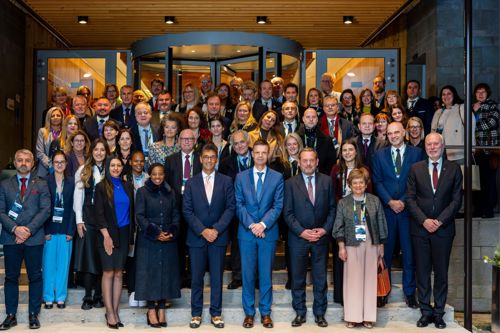The Parliamentary Ombudsman contributes to discussions on a range of interconnected and pressing human rights challenges
Published December 06, 2024

On the second day of the Bled Conference on the Effectiveness of Ombudsman Institutions and NHRIs, Judge Emeritus Dr. Joseph Zammit McKeon, Parliamentary Ombudsman of Malta, actively engaged in discussions examining a range of interconnected and pressing human rights challenges. In a session dedicated to exploring the links between climate crises, migration, and an ageing society, he joined Maria Stylianou–Lottides, Commissioner for Administration and the Protection of Human Rights of the Republic of Cyprus (also Regional Director for Europe of the International Ombudsman Institute and First Vice-President of the Association of Mediterranean Ombudsmen); Dr. Dijana Možina Zupanc, Deputy Ombudsman of the Republic of Slovenia; and Dr. Ákos Kozma, Commissioner for Fundamental Rights of Hungary. Moderated by Tena Šimonović Einwalter, the Ombudswoman of Croatia and a member of the Council of Europe’s European Commission Against Racism and Intolerance, this panel confronted the multifaceted challenges brought about by climate-induced displacement, demographic shifts, and increasing pressures on social services and healthcare systems.
Addressing emerging human rights issues
The morning’s focus centred on the complex interplay of climate change, migration, and an ageing population—three critical areas that increasingly demand innovative human rights protections and advocacy. Ombudsman Zammit McKeon, alongside fellow ombudspersons and commissioners, underscored the importance of ensuring that human rights are not taken for granting with the risk of being overlooked when addressing environmental degradation, population movements, and the rights of older persons. Ombudswoman Šimonović Einwalter’s expertise on issues of discrimination, equality, and the ethical implications of emerging technologies enriched the conversation, emphasising the need for vigilance and adaptability.
Climate change, migration, and ageing societies
The panel examined how climate-induced migration, resource scarcity, and demographic changes are reshaping social structures and testing the resilience of human rights frameworks. Strategies to ensure fair treatment and integration of migrants and refugees, as well as the implications of climate-driven displacement, were at the forefront of discussions. Equally important was safeguarding the rights of older persons in rapidly changing social and environmental contexts. Ombudsman Zammit McKeon highlighted the necessity of remaining alert to human rights breaches, even when not explicitly mandated, arguing that what were once considered theoretical challenges are now urgent, concrete issues requiring decisive action.
The panellists stressed that Ombudsman Institutions and NHRIs have a duty to anticipate and respond to evolving conditions. While legal and policy frameworks may lag behind these rapid changes, institutions must seek practical, action-oriented solutions rather than relying solely on theoretical constructs.
Innovating for the future
As the conference approached its conclusion, attention turned to forward-looking solutions. A final panel, featuring distinguished speakers such as Emily O’Reilly, European Ombudsman, and Rafael Ribó, former Catalan Ombudsman, considered how Ombudsman Institutions and NHRIs can adapt to remain effective. They explored the role of technology, digital transformation, public engagement, stronger policy frameworks, and robust legislative initiatives in fostering greater resilience and responsiveness.
In her video address, the European Ombudsman emphasised that the work of these bodies unfolds against a backdrop of global realignment and, at times, waning sensitivity to human suffering. Resilience, creativity, and a steadfast belief in their mission, she noted, are vital attributes for institutions striving to protect and promote human rights in an ever-changing world.
Charting a way forward
The second day’s discussions reinforced the idea that Ombudsman Institutions and NHRIs must continually evolve to address contemporary challenges. Participants acknowledged that while such institutions often operate with ‘soft law’ powers, their impact can be profound if they remain flexible, proactive, and confident in their mandates. Collaboration, interdisciplinary thinking, and sustained engagement with communities, policymakers, and international partners emerged as recurrent themes.
By focusing on practical solutions and forward-looking strategies, the Bled Conference ensured that the sessions were not merely academic exercises but opportunities to forge pathways towards stronger human rights protection. With the input of experts, ombudspersons, and human rights advocates, the proceedings offered a clearer vision of how these institutions can adapt, thrive, and ultimately serve the best interests of individuals and societies alike.